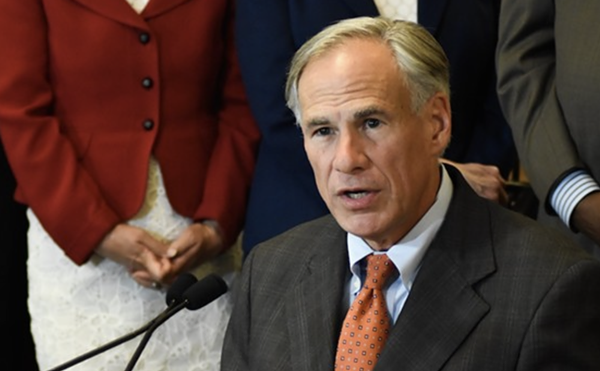In a letter dated September 26, 2008, the Texas Rangers threw former City of San Antonio Telecommunications Manager John Foddrill a long overdue rope. The 57-year-old grandfather of three has spent the past two and a half years trying to convince a host of law-enforcement agencies to investigate his former employer, the City’s Information Technology Services Department, for grant fraud and billing irregularites that at best covered up a million-dollar slush fund and at worst shielded untold thousands of dollars in payments to unauthorized contractors for unauthorized expenses. Since the City escorted him off its premises in March 2006, Foddrill has been hanging onto the increasingly fragile hope that his whistleblower suit against the City, scheduled to begin mid-month, will be backed up by a criminal
investigation.
The Rangers’ letter promises to assign an officer to examine Foddrill’s allegations, and if they appear substantive enough, to ask Bexar County District Attorney Susan Reed to request a formal investigation. Which may sound circuitous — and to Foddrill it is.
Since the City fired Foddrill in March 2006 for alleged poor job performance, he has sent a volley of increasingly frantic-sounding letters to Reed, the FBI, the Rangers, and pretty much the entire South Texas state and federal Congressional delegations, seeking validation for the crusade that he says got him fired from his job. The missives typically run to several pages and are usually accompanied by CDs filled with documents Foddrill obtained through open-records requests or his attorney. It’s a complicated stack to work your way through, especially if you’re not an accountant or a lawyer. But it doesn’t take a Texas Ranger to figure out that something was rotten in Foddrill’s old department. And while it’s curious, to say the least, that the DA has so far declined to even look into the case, that’s a story for another day.
In February 2005, Foddrill was still a happy new employee in the City’s ITSD, which oversees the municipal phone and data networks. His division, the Voice Group, had the undivided attention of only four of 244 employees, but the 23-year SBC veteran, who also helped Valero set up its voice network, was digging into the workload. His employer seemed pleased, too, naming him Employee of the Month just six months into the job, citing his “positive attitude,” “work ethic,” and a “contagious” enthusiasm.
But that sunny little writeup was already clouded by trouble. Not long after he arrived at ITSD, Foddrill says he began hearing rumors about the “telephone variable,” an essentially unsupervised pot of money funded by the City’s various departments and dedicated to paying for overhead telephone costs — the personnel and equipment the Voice Group needed to provide phone service. Created 28 years ago to consolidate City phone bills, Foddrill says the variable was regularly used by department heads to balance their budgets or pay for items for which they didn’t have sufficient funding. In ITSD’s case, the variable was raided for an office remodel, a trophy case, department training, and equipment unrelated to phone service. In effect, other City departments were paying for items that had nothing to do with their phones, and nothing really to do with their departments.
“It was really neat,” says Foddrill. “Unless it was your budget being drained.”
As it happens, it was Foddrill’s budget being drained. Short on employees and cash, he says, in March 2005 he explained his concerns to then-Director Gary Moeller. He got nowhere, he alleges, in part because his immediate supervisor, Communications Manager Jose Medina, used the variable money to hand out favors to coworkers and other department heads.
In April, an already tense situation worsened when auditors from the City’s Contract Services Department began poking around ITSD. Foddrill alleges that Medina pressured him to provide incomplete or false answers to the auditors, and made a habit of coming into his office whenever an auditor was present to keep an eye on his responses. This lack of transparency made Foddrill curious, and as he began to look more closely at the department’s contracts with outside equipment and service providers, he became increasingly alarmed by what he found: invoices that couldn’t be reconciled, missing documents, what appeared to be padded invoices with significant markups billed to ITSD. In particular he was concerned about ITSD’s dealings with Avaya, a long-term provider of City services.
Following a detailed, diplomatically worded April email from Foddrill to Medina suggesting better invoice and supervision procedures for the Avaya contract, and increasingly tense face-to-face exchanges, in June he told Medina that he was going to talk to the ITSD Chief Information Officer about his concerns. Medina, he alleges, threatened him.
The Avaya loophole
If Foddrill’s allegations that he was pressured not to cooperate with the contract audit and was threatened for refusing to go along with the coverup come down to hard to verify he-says/she-says, the problems Foddrill claims he wanted to expose to greater scrutiny are well-documented in the City’s own paperwork.
Foddrill and Contract Services weren’t the only ones looking into ITSD’s business. In January 2005, then-City auditor Pat Major was wrapping up her field work on a report that would be presented to City Council in June.
Major’s 2005 audit detailed a lack of oversight and checks and balances on “two high-risk contracts,” and incomplete or missing contract files. In her summary, Major gives ITSD props for cooperating fully in the investigation process, but given the documents that Foddrill’s lawsuit has unearthed, one has to wonder whether the auditor’s department got the full story. (Foddrill never saw Major’s report while he was at ITSD, and claims he didn’t even know it existed until he received it through an open-records request long after he was fired.)
In February 2006, the Contract Services Department delivered its final report to ITSD Acting Director Hugh Miller. This report, for which Foddrill was a major source, identified five “key” contracts that ITSD had with companies such as AT&T-Cingular, Integritel, Inc., Microsoft, and Avaya as “high risk.” In layperson’s terms, this means, for instance, that Avaya, the compay that was giving Foddrill so much heartburn in April, was buying services from vendors they weren’t authorized to use under their government contracts, and marking up those vendors’ charges by 20-30 percent before submitting them to ITSD for payment. One of these subcontractors, IG Communications, had been paid at least a quarter of a million dollars between July 2004 and July 2005, including billing ITSD $183 per employee per month for rent, in addition to $30 trip charges to travel to a City facility — explanations Foddrill says Medina offered in hindsight to cover up padded invoices.
The CSD report also notes that “the telecommunications manager brought to CSD’s attention” two invoices for work that was requested from another Avaya vendor, SanTel, rather than from the approved provider, Integritel. The bottom line, the report concludes, is that the City paid three times more than it should have for the services.
Emails from Foddrill to the report’s initial investigator, Orlando Martinez, support Foddrill’s claim to have been working, clandestinely, with CSD to unravel Avaya’s complicated, and lucrative, finanical relationship with ITSD. But lest you think that this report vindicates Foddrill, it goes on to allege that the overpayments were in large part the telecommunications manager’s fault, because he wasn’t “properly reviewing pricing
information.”
Historic revision
Standing on its own, the Contract Services audit might look like Defense Exhibit A for an argument that Foddrill wasn’t doing his job. But read in context with a slew of emails and related documents, it appears to be one more entry in a concerted Cover Your Ass campaign put in place to resolve ITSD’s serious contract and management issues, while getting rid of the troublemaker who forced them into the light.
On September 1, 2005, just as Foddrill was sitting down with the City’s Office of Municipal Integrity to report what he felt was a pattern of professional retaliation for his threat to air ITSD’s dirty laundry, ITSD Acting Director Miller wrote an alarmed-sounding email to Municipal Integrity Manager Virginia Quinn:
“This is the memo from Contract Management with their findings on some of our contracts,” wrote Miller. “I wanted to see if you see anything unusual with the level of things that are being mishandled, because it doesn’t look very good.” Miller goes on to note that his fiscal/contract manager has informed him that the department is still using IG Communications, even though they were instructed to drop them, and that Avaya is being used for projects that should be handled under other contracts. “I have put a stop to these this week and have made changes to the way these are handled,” he concludes, “but it was recommended to forward you this memo.”
Phew. One fire out.
But, of course, a Municipal Integrity investigation was now under way, too. Which of all the disappointing actions in this strange tale yielded the most spectacular CYA move yet.
After Foddrill first sat down with Municipal Integrity investigator Steve Harrison on August 29, he would frequently call for updates. Harrison would tell him that the investigation was going to take a long time, says Foddrill. Then, abruptly, Harrison phoned in early October to tell him that the case was closed, and didn’t come out in his favor. Foddrill says he was refused a copy of the report at that time, which is a shame, because he would have found it interesting. After interviewing more than one invididual who expressed discomfort with the telephone variable, including Management & Budget Director Peter Zanoni, Quinn and Harrison nonetheless conclude that Foddrill’s allegations as a whole are unfounded.
“As I previously communicated to Hugh Miller,” wrote Quinn in a November 2005 memo to Miller, Zanoni, and ITSD Chief Information Officer Michael Armstrong, “we have concluded the investigation based on the allegations raised by Mr. John Foddrill. The case file is closed with the notation ‘lack of evidence/unfounded.’ I wanted to close the loop with you, however, and communicate our findings on one particular area of concern.” Quinn proceeded to detail ITSD’s abuse of the “telephone variable.”
“We established that the telephone ‘variable’ has been used to pay for items completely unrelated to City telephones ... If, during the course of the year, any single department incurred a large unbudgeted cost item, it was likely that the ‘variable’ would be tapped so that the cost of this item could be spread across City departments,” explained Quinn.
“The largely unsupervised and unregulated billing of departments across the City under the guise of the telephone ‘variable’ for the last 25 years has resulted in departments having been billed for an untold amount of goods and services from which their department received no benefit or for costs that rightfully should have been borne by ITSD.”
And then, the salt.
“No laws or written rules were violated in the administration of the telephone ‘variable’ because there never were any,” concluded Quinn. An enormous, unsupervised slush fund used for professional gain? “Unsound,” yes. A direct cause of a “laissez-faire fiscal environment,” certainly. But not technically illegal.
Even if Quinn’s correct — and the final chapter has yet to be written now that the Rangers are involved — that’s hardly the moral high ground. Nonetheless, the City will be defending it when Foddrill’s wrongful-termination case goes to trial later this month.
The action a purported whistleblower reports “has to be a violation of the law,” says City Attorney Debi Klein, not just a questionable accounting practice. And Foddrill has to have “made his allegations in good faith.” An element of the City’s case, she said, is questioning whether Foddrill knew that the problems he was raising were in fact not illegal.
“I don’t agree with that interpretation,” says Foddrill’s attorney, Malinda Gaul. The relevant Texas whistleblower statute says “violations of law,” she argues, and talks about policies and procedures as well as statutes.
Foddrill scoffs at Klein’s and Quinn’s spin on the telephone variable. “Why doesn’t everybody `tap the fund for unrelated expenses`?” he asks. “Because they know it’s illegal, and you can’t get away with it.”
And, of course, there’s still the Avaya contract, which was allowed, or even encouraged, to run off the books.
Do as we say, not as we do
If the City abided by its own guidelines, Foddrill’s attempts to bring accountability to the telephone variable and ITSD’s contracts should have been commended. For a May 2008 presentation to the Institute of Internal Auditors in Fort Worth, former Office of Municipal Integrity Manager Quinn took a PowerPoint slide show that begins with a list of fraud the City of San Antonio investigates: Cash & Accounting, Theft of Assets, and government-contract fraud, for starters. The presentation goes on to define “Employee fraud” as “Employee activity which undermines and defrauds either the employer and/or the end consumer of the employer’s services (in the case of the City, it’s the citizens).”
“Paper fraud,” it notes, can include sales invoices, transactions, and purchase orders.
After another slide issues a broad warning about vendors and contractors, who often know the system better than City staff, up comes a slide on “conversion,” the crime of using something that belongs to your employer in an unlawful or unethical manner, or for personal benefit. The slide on “theft” as defined by the Texas Penal Code is even more interesting. Plain-old theft is appropriating property with the intent to deprive the owner of the property. But it’s worse, in the law’s eyes, if the property in question came into the offender’s control by virtue of their role as a public servant. Like, say, a telephone variable fund?
The ironies go on, but I’ll leave you with one last example. On a slide bragging about the City’s big fraud busts, it lists “vendor up-charges” – padding bills, e.g., perhaps not unlike the crew at Avaya/IG. These days Quinn is a grants officer at the Department of Aviation. When we spoke recently, she said she didn’t recall the 2005 memo about the telephone “variable.” She asked me to fax it to her, and said she’d ask for permission from the City Attorney’s office to speak to me. I suggested she get permission first; as of press time she hadn’t called back.
Perhaps Quinn also doesn’t recall that while her department was assisting in the dismantling of Foddrill’s COSA career, new department head Miller was following up on his CYA by putting the telecom manager in a virtual corner: taking away his title, his authority, and any chance for
promotion.
“By September, I had no responsibility,” recalls Foddrill. “It was like a mother-may-I situation.”
In November, Foddrill says, CIO Armstrong told him he was a disgrace because he went to Municipal Integrity with unfounded charges — a claim Foddrill says he has backed up on tape. On February 8, 2006, Foddrill was put on administrative leave, and on March 13, he was terminated. Since then, he has devoted much of his time to trying to get Reed’s office to investigate his charges, while continuing to amass evidence of poor management and wrongdoing at his old department.
That information won’t necessarily come to play in his trial — which, says his attorney, doesn’t have to prove Foddrill’s allegations are true, only that they were good-faith allegations of illegal activity. But Foddrill hopes he might find use for it yet ... at his old job.
“I need to go back to work,” says Foddrill. “They’ve got my pension. They’ve got my health care.” It’s not a great job market for a 57-year-old, he says, especially one with a black mark on his employment record. And he actually wants to return to the department that caused him so much stress.
“I’ve got some good people there,” he says. The City isn’t the culprit, he adds. “It’s a handful of crooks that need to be escorted out in handcuffs.” •

















